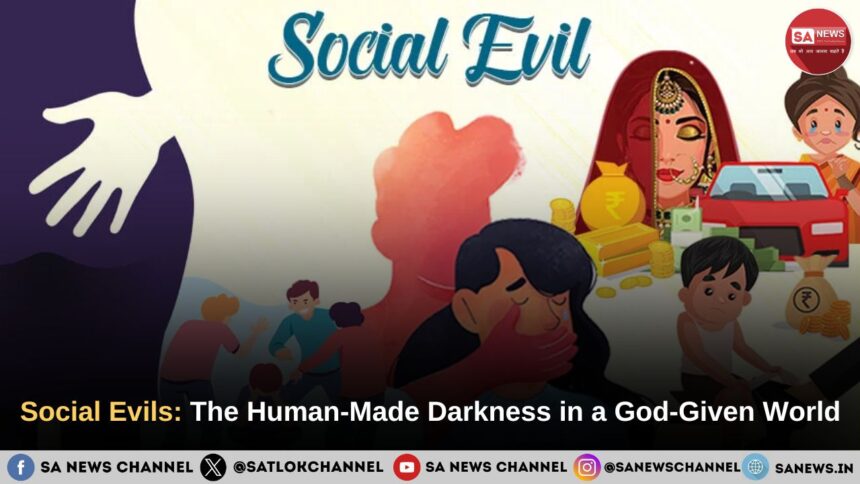Social Evils: The world we live in is both beautiful and harsh. It is beautiful because of the flora and fauna, the kindness of people, and the abundant food that God has blessed us with. But it is also home to many cruel and inhumane practices—social evils—that we humans have created.
So, what exactly are social evils? Unlike the beauty of nature which is the creation of the Supreme Almighty, social evils are the result of human actions. This leads to a disturbing question: are we, as humans, being wicked to one another and disrespecting our fellow beings? Sadly, the answer seems to be yes.
The State of Humanity Today
In today’s era, humans have continued to mistreat each other. Discrimination between the rich and poor is just one example. But we must remember that at one point in time, all humans shared similar origins—we evolved from ape-like ancestors. So why this needless cruelty and social injustice?
Social Evils of the Past
Violence and cruelty are not new; they have existed for centuries. History holds many shocking examples. One such practice in Hinduism was Sati.
Also Read: 8 Ways To Build A Supportive Social Circle
Sati was an inhumane ritual, practiced for centuries and prevalent until the early 19th century, where a widow was burned alive along with her deceased husband’s body. Thankfully, this horrifying act was banned in 1829 due to a movement led by Raja Ram Mohan Roy and enforced by Lord William Bentinck.
Other regressive practices that plagued society included child marriage and untouchability.
- Child marriage involved marrying off children—especially girls—before the age of 18.
- Untouchability was a form of caste-based discrimination, where those from upper castes were forbidden to touch or even interact with those from lower castes.
These were all dark chapters in our history, but unfortunately, many such evils persist even today.
Social Evils in the Modern World
Our so-called “civilized society” continues to be riddled with serious issues like the dowry system, religious intolerance, drug addiction, corruption, and casteism.
1. The Dowry System
Dowry is a so-called “gift” given by the bride’s parents to the groom’s family. In India, especially in northern states, dowry has become a norm with even unofficial “rate charts” for different professions.
While the rich may afford these “gifts,” the poor are pushed into unbearable debt. Tragically, many women commit suicide due to dowry-related harassment. Between 2013 and 2022, over 73,000 dowry deaths were reported in India.
Though the Dowry Prohibition Act of 1961 was enacted, we must ask: has it really helped? Is India truly free from dowry demands?
2. Drug Addiction
Another major concern is drug addiction, especially among youth aged 15 to 35. Commonly abused substances include painkillers, alcohol, tobacco, cough syrup, and bhang(an edible cannabis preparation used in some Indian traditions).
Also Read: A Deep Insight into the Reforms of Unparalleled Social Reformer Sant Rampal Ji
Families suffer deeply, as addicts often face health problems and become involved in crime to support their addiction. Campaigns like Nasha Mukt Bharat Abhiyan and the setup of rehab centers are steps in the right direction, but the results are far from encouraging.
Is There a Way Out?
Social evils are deeply rooted in our history and present, but they are not unchangeable. Education, kindness, and awareness can play a pivotal role in eradicating them. Let us help the poor, spread compassion, and enlighten others—because true progress begins with moral awakening. However, even this effort has been in vain given the chaos around us.
To answer the question asked in the previous segment: yes, there is a way—but it doesn’t lie solely in government policies. The solution must come from a deeper, spiritual level. Our current education system fails to impart spiritual wisdom, which is essential for moral guidance.
Saint Rampal Ji Maharaj from Barwala-Hisar, Haryana, is imparting true spiritual knowledge that transforms lives. His followers:
- Do not demand or give dowry
- Avoid all forms of intoxication
- Do not consume meat
- Do not accept or offer bribes
When asked why, they all say: “Because it is sinful and displeases the Supreme Almighty Kabir Sahib.”
To those families struggling with these evils, we urge you to listen to the spiritual teachings of Saint Rampal Ji Maharaj. You can find them on the YouTube channel Sant Rampal Ji Maharaj, or request a free copy of the life-changing book Gyan Ganga
FAQs
How can we stop social evils?
True spiritual knowledge and education play a crucial role in stopping social evils.
What is one of the greatest social evils of our country?
There are many, including dowry, racism, and honour killings.
What are social evils?
Evil practices that cause suffering and pain to others, such as killing the innocent animal, discriminating, and child marriages
Which social evils do you find today?
Drug addiction, inequality, dowry and corruption.








